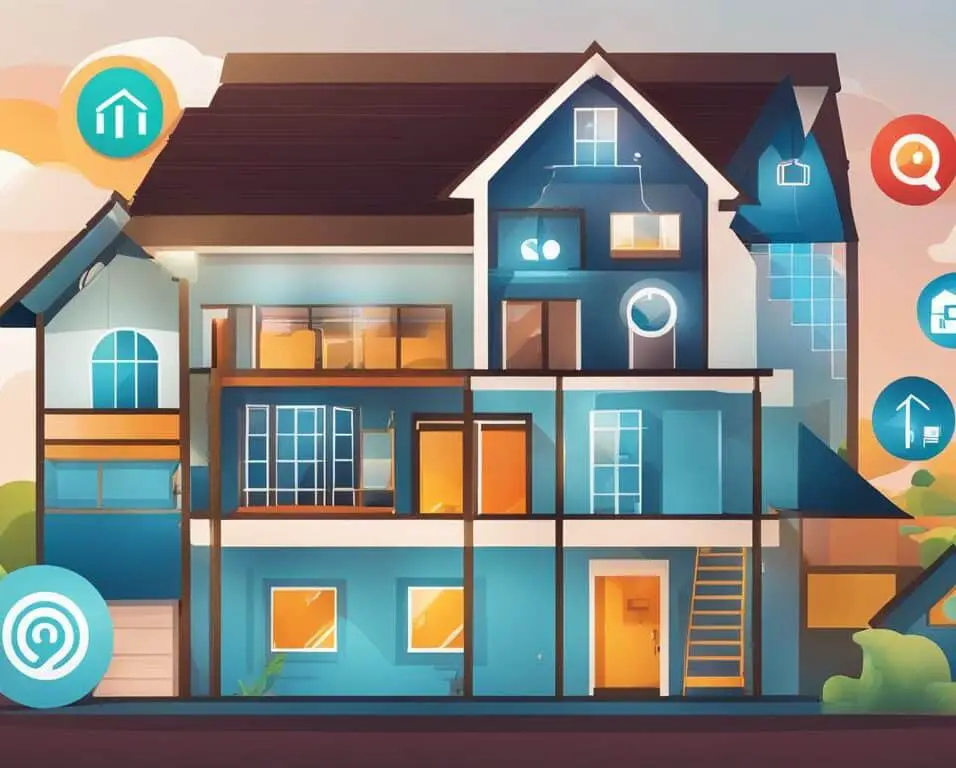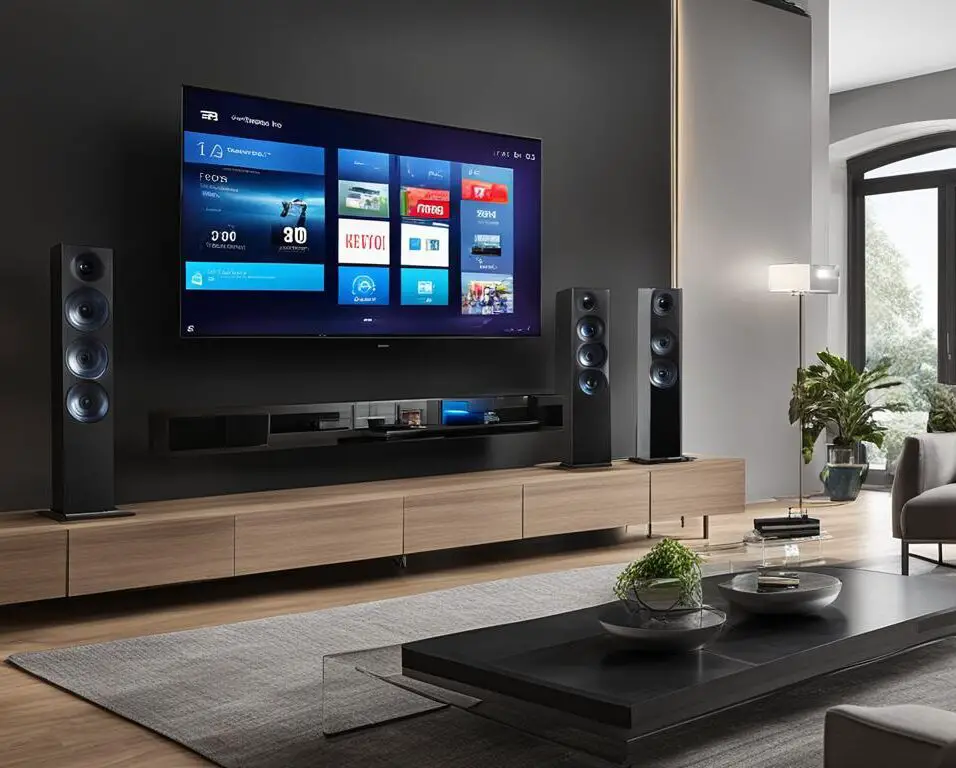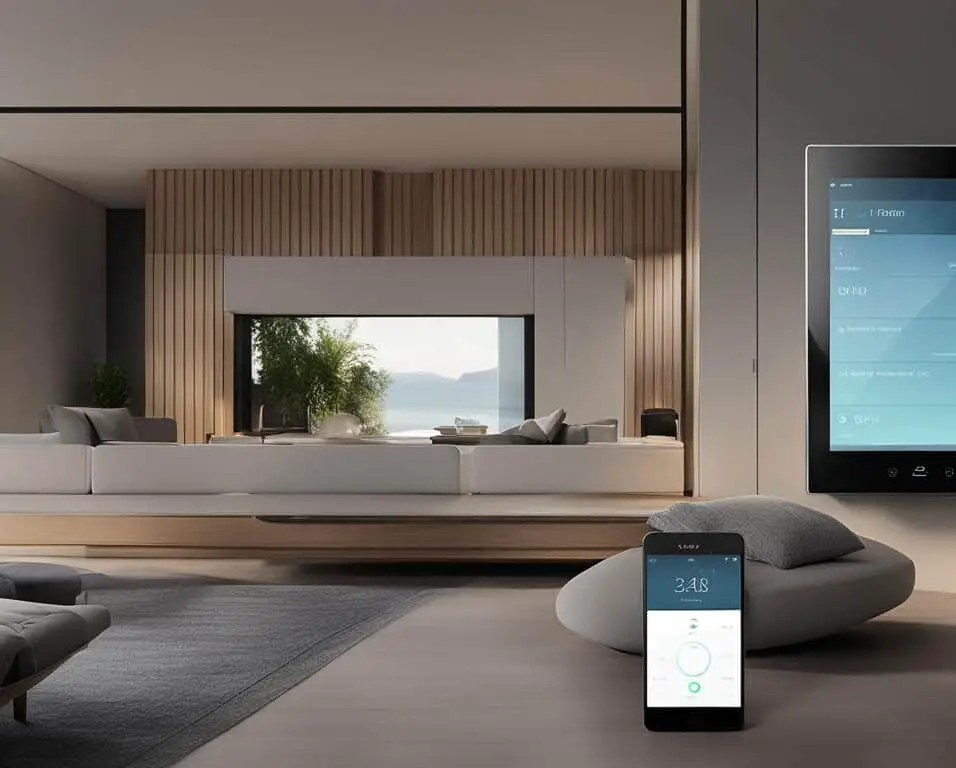The Intersection of Smart Homes and Sustainability
Smart home technology has the potential to revolutionize the way we manage and reduce home energy consumption, paving the way for a more sustainable future. By leveraging automation, data analysis, and intelligent decision-making, smart home systems can help lower energy consumption and have a positive impact on global energy use. Quality is crucial in developing sustainable smart home solutions, as high-quality products optimize power management capabilities and enable more efficient energy use. Technologies such as smart thermostats, energy-efficient lighting systems, and integrated energy monitoring contribute to energy conservation in smart homes. Additionally, the integration of renewable energy sources, like solar panels, further enhances energy management and reduces reliance on traditional energy sources.
Key Takeaways:
- Smart home technology can revolutionize home energy consumption and contribute to a more sustainable future.
- High-quality smart home products are crucial for optimizing power management capabilities and promoting efficient energy use.
- Technologies such as smart thermostats, energy-efficient lighting, and integrated energy monitoring help conserve energy in smart homes.
- The integration of renewable energy sources, like solar panels, further enhances energy management and reduces reliance on traditional energy sources.
- Smart homes offer the potential to reshape our future by utilizing technology to improve sustainability and promote a greener way of living.
The Rise of Smart Homes and their Advantages
Smart homes are revolutionizing sustainable living solutions and paving the way for a greener future. With the global smart home market expected to exceed $158 billion by 2024, the adoption of eco-friendly home automation systems is on the rise, offering numerous advantages in terms of energy efficiency and environmental sustainability.
One of the key benefits of smart homes is their sustainable energy management capabilities. These systems provide homeowners with the ability to monitor and control their energy consumption, allowing for informed decisions to be made in reducing energy usage. By identifying inefficient appliances and implementing automated energy-efficient systems, smart homes contribute to energy conservation and cost savings.
Furthermore, smart homes integrate green home technology, such as energy-efficient lighting systems and smart thermostats, which optimize power management capabilities and reduce overall energy consumption. The integration of renewable energy sources, like solar panels, further enhances the sustainability of smart homes, reducing reliance on traditional energy sources and minimizing the carbon footprint.

The Advantages of Smart Homes:
- Energy monitoring and control capabilities
- Identification of inefficient appliances
- Automated energy-efficient systems
- Integration of renewable energy sources
- Reduced reliance on traditional energy sources
- Cost savings and reduced carbon footprint
In conclusion, smart homes offer a range of advantages when it comes to sustainable living. With their energy management capabilities, integration of green home technology, and utilization of renewable energy sources, smart homes contribute to energy conservation and promote a greener way of living. By embracing eco-conscious home automation, we can create a more sustainable future for generations to come.
The Challenges and Opportunities of Smart Homes for Sustainability
As we embrace the potential of smart homes for sustainability, we must also acknowledge the challenges that come along. One of the key concerns is the energy consumption of AI-powered devices, like voice-controlled systems such as Alexa. These devices, while enhancing our lives with convenience, often have high energy demands, potentially rivaling those of entire nations. Moreover, advancements in AI technology, particularly generative models like GPT, further escalate energy consumption.
However, the industry leaders and researchers have become increasingly aware of the need to address these challenges and develop sustainable practices in smart home technology. Efforts are underway to create AI technologies that not only enhance our lives but also prioritize environmental responsibility. This shift towards sustainable innovation is essential to ensure that smart homes contribute to energy conservation and sustainable living.
While there are challenges, there are also significant opportunities for smart homes to further advance sustainability. As technology continues to evolve, future developments hold promise for even more energy-efficient interactions and greater harmony with the environment. Innovations such as optimized power management capabilities and intelligent decision-making can contribute to reducing energy consumption in smart homes.
These efforts towards smart home energy conservation and sustainable living innovations have the potential to reshape our future. By leveraging technology and promoting a greener way of living, smart homes can play a vital role in improving sustainability and creating a more environmentally conscious society.
FAQ
How can smart home technology help reduce home energy consumption?
Smart home systems leverage automation, data analysis, and intelligent decision-making to lower energy consumption and have a positive impact on global energy use. By optimizing power management capabilities and enabling more efficient energy use, high-quality smart home products contribute to energy conservation.
What are some technologies that contribute to energy conservation in smart homes?
Smart thermostats, energy-efficient lighting systems, and integrated energy monitoring are examples of technologies that contribute to energy conservation in smart homes. Additionally, the integration of renewable energy sources, such as solar panels, further enhances energy management and reduces reliance on traditional energy sources.
What are the benefits of smart homes in terms of sustainability and energy efficiency?
Smart homes offer numerous benefits in terms of sustainability and energy efficiency. They provide energy monitoring and control capabilities, allowing homeowners to identify inefficient appliances and make informed decisions to reduce energy consumption. Integration of renewable energy sources and automated energy-efficient systems also enhance the sustainability of smart homes, resulting in cost savings and a reduced carbon footprint.
What is the projected growth of the smart home market?
The global smart home market is projected to exceed $158 billion by 2024, with an estimated 47 million households expected to have smart home systems installed by 2023. The energy management segment of the smart home market is expected to witness significant growth during this period.
What are the challenges associated with smart homes and sustainability?
One challenge is the energy consumption of AI-powered smart home devices, which may have high energy demands. Advances in AI technology, such as generative models, further increase energy consumption. However, there is a growing awareness among industry leaders and researchers about the need for sustainable practices in smart home development, and efforts are being made to create AI technologies that prioritize environmental responsibility.
How do smart homes contribute to a greener way of living?
Smart homes utilize technology to improve sustainability and promote a greener way of living. By optimizing energy consumption, integrating renewable energy sources, and providing energy monitoring and control capabilities, smart homes reshape our future by utilizing technology to improve sustainability and promote a greener way of living.
Source Links
- https://www.csrwire.com/press_releases/782811-quality-smart-home-systems-enable-sustainable-future-through-power
- https://ts2.space/en/the-intersection-of-ai-advancements-and-sustainability-in-smart-homes/
- https://utilitiesone.com/smart-homes-and-energy-efficiency-engineering-sustainable-living-spaces








